

Inquiry-Based Lesson Plans. Inquiry Learning Student understanding is the central focus of inquiry learning.
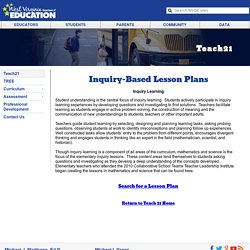
Students actively participate in inquiry learning experiences by developing questions and investigating to find solutions. Teachers facilitate learning as students engage in active problem solving, the construction of meaning and the communication of new understandings to students, teachers or other important adults. Teachers guide student learning by selecting, designing and planning learning tasks, asking probing questions, observing students at work to identify misconceptions and planning follow up experiences.
Well constructed tasks allow students’ entry to the problem from different points, encourages divergent thinking and engages students in thinking like an expert in the field (mathematician, scientist, and historian). Though inquiry learning is a component of all areas of the curriculum, mathematics and science is the focus of the elementary inquiry lessons. Inquiry Based Science Lesson Plans. Exemplars inquiry-based investigations provide teachers and administrators with a way of teaching and assessing science-process and communication skills.
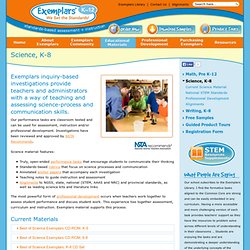
Our performance tasks are classroom tested and can be used for assessment, instruction and/or professional development. Investigations have been reviewed and approved by NSTA Recommends. Science material features: Template. Why create lesson plans?
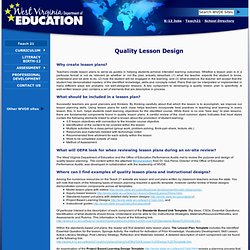
Teachers create lesson plans to serve as guides in helping students achieve intended learning outcomes. Whether a lesson plan is in a particular format is not as relevant as whether or not the plan actually describes (1) what the teacher expects the student to know, understand and be able to do, (2) how the student will be engaged in the learning, and (3) what evidence the teacher will accept that the student has demonstrated mastery of the identified knowledge, skills and concepts noted. Plans that can be interpreted or implemented in many different ways are probably not well-designed lessons. A key component to developing a quality lesson plan is specificity. A well-written lesson plan contains a set of elements that are descriptive in process. What should be included in a lesson plan?
Successful teachers are good planners and thinkers. Inquiry-based Learning: Demonstration. Inquiry based lesson plan templates. Www.pblearning.com/uploads/4/7/9/6/4796041/pbl_student_template.pdf. PBL and Common Core — and Next Generation Science Standards. Teach21 Unit Plan. - This website has an explanation of the fluid mosaic model. - This website is a good interactive site on cell membranes and their functions and is the "Cell Membrane Website.
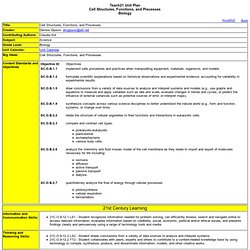
" Lesson 5 materials: a computer with Internet capabilities is needed for each student or student pair. Lesson 6 materials for each student: background material for the cell (tag board, Styrofoam sheet, construction paper, etc.); various colored items to make the cell organelles: pipe cleaners cut in pieces, pom poms, stars, stickers, macaroni or other pasta, and other small objects as available; glue and/or tape; labels or pieces of paper to make labels; scissors Lesson 7 materials: cooking oil, water, and a beaker for the demo; one container of soap bubbles with a wand per student pair; an LCD projector and screen with an Internet-enabled computer; tag board, scissors, and tape for the word wall. The website with the membrane components is The lab is from Flinn Scientific, Inc., at. Teach21 Unit Plan. Instructional Guides.
Writing Rubrics. De.state.wv.us/instruction/UsingtheLessonPlan.htm. The effective vocabulary teacher builds a word-rich environment in which students are immersed in words for both incidental and intentional learning.
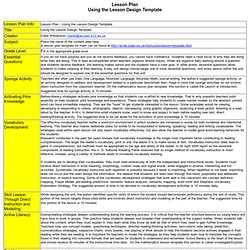
This teacher also makes deliberate plans for words to be incorporated in listening, speaking, reading and writing vocabularies. The strategies used within each lesson not only teach vocabulary effectively, but also allow the teacher to model good word-learning behaviors for the students. Research conducted in the past ten years reveals that vocabulary knowledge is the single most important factor contributing to reading comprehension.
The larger the reader’s vocabulary, print or oral, the easier it is to make sense of text. Vocabulary instruction does lead to gains in comprehension, but methods must be appropriate to the age and ability of the reader. If students are to develop their vocabularies, they must read extensively at both the independent and instructional levels. De.state.wv.us/instruction/documents/RigorandRelevanceFrameworkApplication.pdf. Teach21 Unit Plans - Search. Template. In order to provide consistency across Project Based Learning (PBL) professional development and the development of resources for Teach 21, the WVDE Office of Instruction adopted a project design template for use with PBL.
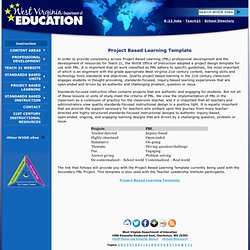
It is important that all work classified as PBL adhere to specific guidelines, the most important of which is an alignment with the grade appropriate West Virginia 21st century content, learning skills and technology tools standards and objectives. Quality project based learning in the 21st century classroom engages students in thought-provoking, standards-focused, inquiry-based learning experiences that are open-ended and driven by an authentic and challenging problem, question or issue. Standards-focused instruction often contains projects that are authentic and engaging for students. But not all of these lessons or units of study meet the criteria of PBL.